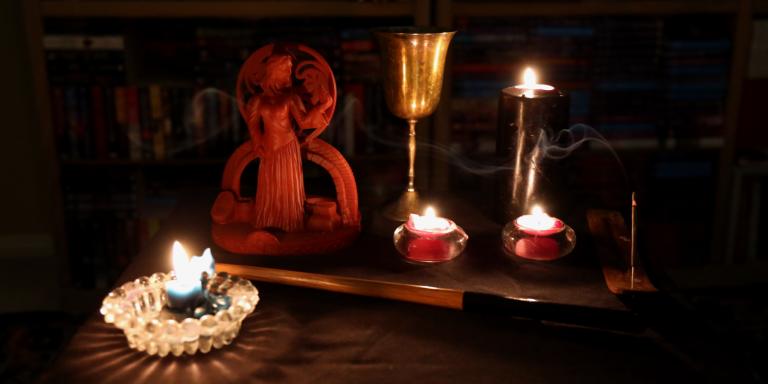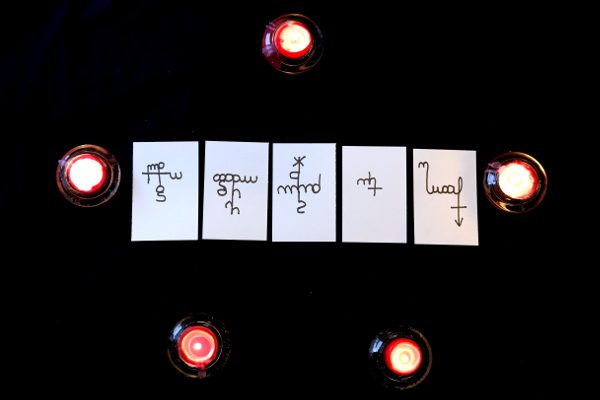What is magic and how does it work? For most of us, that question is less important than how we make magic work. If we can do the spells and get the results, does it really matter how it happened? But some of us are forever curious, and if you want to get past cookbook spells written by someone else and start doing your own magic, you need to have some idea of what’s going on when you cast circles, light candles, and chant incantations.
The hot topic in the magical community these days is grimoire magic, the ancient art of summoning spirits to do your bidding. I’ve enjoyed learning about the grimoire tradition in the recent class taught by a certain chaos magician. It is an old and proven form of magic, but it is not the only form of magic. I recently saw a well-known Pagan teacher say “there is no magic without spirits.” I do not agree.
I came to a three-fold understanding of magic very early on my Pagan journey. In the 24 years since, I’ve had countless magical successes (and failures), I’ve studied magic and religion in great depth, and I’ve had experiences that have rearranged my understanding of the world and what is and isn’t possible. My theology has changed, my philosophy has changed, and my practice has changed. But the way I understand magic has remained constant, because I’ve yet to find a better model for how magic works.
What is magic?
Defining magic is hard. There’s still a bit of “I know it when I see it” involved. When pushed, I fall back on Aleister Crowley’s classic definition: “the Science and Art of causing Change to occur in conformity with Will.” Magic is a science and an art, it’s about creating change, and it involves intent and will. It doesn’t attempt to draw a bright line between ordinary efforts and Otherworldly efforts – all those lines usually accomplish is getting in the way.
I was teaching a magic class a few years ago, and there was the usual socializing and chatting before the first meeting. When the starting time came, I sat down, pulled out a piece of paper, and wrote “quiet please” on it. I held the paper up – people gradually noticed and stopped talking. After a few seconds of silence, I said “look what I just did. I drew some lines on a sheet of paper and the room got quiet. You’ve just seen an example of successful magic.”
Not all magic is that simple or that ordinary. But mastering simple and ordinary magic opens our eyes to deeper and more complex magic. And it reminds us of the most important criteria in evaluating magic: regardless of the means and methods, did it work or not?
When we examine what works, we start to notice that things tend to fall into three broad categories. This is my three-fold understanding of magic.
The intercession of Gods and spirits
I occasionally see people who say “magic is just like prayer.” There’s usually an undercurrent of “please don’t be afraid of me” involved here, but there’s some truth to it. Sometimes magic is just like prayer. We ask a God, or an ancestor, or some other spirit to do something for us, and they do. My relationship with the Morrigan began this way – I asked for her help and she responded. After the third time, she said “I have done this for you, now I want you to do something for me.”
Both believers and skeptics can point to studies on the efficacy of prayer that support their views. I’ve seen enough first-hand results over the years to convince me. Intercessory prayer may not always give us what we want (or even what we ask for), but it has an impact on our lives.
Why would Gods or spirits grant our requests? What’s in it for them?
Sometimes they’re in agreement with us – they want what we want. My early prayers to the Morrigan were for protection for friends in distant places who were in physical danger. This is well within the scope of interest for a Battle Goddess. We had a common interest, I brought a need to her attention, and she chose to act.
Other times there’s a transaction involved – reciprocity makes the world go around. The Gods give to us, so that we may give to them, so that they may give to us yet again. A spirit agrees to give us information or to open the way in exchange for certain offerings. A God agrees to do something for us, but they want our service in return. There are as many “hows” and “whys” as there are spirits and people.
Of course, sometimes it’s a little of both. Did the Morrigan grant my prayers because she was in alignment with my requests, or because she saw the opportunity to pull a Druid into her long-term service? I honestly don’t know. The Gods have many virtues, but transparency is not one of them… especially when it comes to the Great Queen.
Magic works by the intercession of Gods and spirits.
The manipulation of unseen forces
If there is no magic without spirits, that means humans have no magic of our own. My personal experience tells me that is not the case.
Most of us know someone who always seems to know things they have no way of knowing. Things “just happen” around them at a rate that belies the claim of coincidence. The more skilled ones can make things happen that should not happen. Is that all being done by spirits? I suppose that’s possible, but it seems more likely that there’s something being done by that particular person.
I’m pretty sure there were no spirits involved in my “quiet please” example. If that seems too ordinary for you, take it a step further into sigil magic… which also involves drawing lines on paper to work the will of the magician. Sigil magic is simple, effective, and it is far better explained by the manipulation of unseen forces than by the intercession of spirits.
What are these unseen forces? They’re often called “energy” and while I don’t think that’s necessarily wrong, it’s important to understand it’s not electromagnetic energy like sunlight and radio waves. It’s no coincidence that the idea of magical energy first arose during the late 19th and early 20th centuries when electric lights and later radio and television transmissions became commonplace. The differences haven’t always been well articulated. Bad science make for bad religion – and bad magic.
Sometimes the power comes from us, while other times we’re merely the conduit for the power of others. Whatever these unseen forces are, there are ways we can manipulate them, whether by raising and directing them (as in the Wiccan Cone of Power) or by more subtle methods (like sigil magic).
Magic works by the manipulation of unseen forces.
Psychological programming
Some magic requires no Otherworldly assistance and no unexplainable forces. Some magic is plain old psychological programming.
Put yourself in a receptive state of mind. Plant ideas, not with words that require conscious translation but with symbols that communicate directly with your subconscious… the part of your brain that runs most of the show anyway. Reinforce it with chanting, dancing, singing, or other actions. Do it all in a setting that looks and feels so different from the ordinary world you resist the urge to kill it with deconstruction and analysis.
Before long you start behaving differently. You start eating differently. You stop biting your fingernails (I’ve done this one successfully several times). You start putting yourself in situations where you can find a job, or a house, or a lover, or a friend… and eventually you get what you worked for. Your world starts to change.
Changing habits is very hard. Doing a spell once won’t be enough – even if you have an initial success, you’ll probably need to work it again and again. That’s OK.
Is it proper to call this magic? Again, if it works, does it really matter?
Magic works through psychological programming.
Sometimes one, sometimes two, sometimes all three
Magic is many things, but one thing it is not is easy. If you can get what you want through ordinary effort, do it. Working magic doesn’t make something happen, it improves the odds that it will happen. If you can just go do it, that raises the odds to 100%.
If you can’t just do it on your own, then you need magic. And if it’s important enough to work magic, it’s important enough to work magic in all three ways.
Raise and direct energy toward your goal. Work sigil magic. Do visualizations. And also pray to your Gods for help. Make offerings to your ancestors for their assistance. Call on a relevant spirit. And also do all this in a way that speaks to your subconscious with sights and sounds and smells.
Overanalyzing something can kill the magic. Do your working, then let it go. But the good news is that belief is irrelevant. If you do the magic properly, you’ll get the results. The best way to believe in magic is to work magic.
When you get the results, which part worked? Again, does it really matter? Most times it’s some combination of all three.
Our understanding of how anything works had a direct impact on how we can make use of it. If we believe magic is only spirits or only unseen forces or only psychological programming we will only use that portion and we’ll ignore other magic that is also available to us. This three-fold understanding of magic has given me the foundation to work the magic I need.

















